How is a smart intelligent hub helping Nigerians exploit weather information? Betty Bonnardel, CEO of AB5 Consulting, explains more.
There is a lot of hype about the Internet of Things (IoT). There is no doubt that the adoption of this technology and the advantages brought by the exploitation of artificial intelligence are increasingly changing the way the industrial and business sectors think and operate. According to a recent report from the World Economic Forum, industrial IoT, for instance, is forecast to add US$14tn to the global economy by 2030. The data gathered by IoT devices, however, is meaningless if it is not analyzed and used to inform decisions. As explained in a recent paper following the CES 2019 exhibition by Sylwia Kechiche, principal analyst at GSMA Intelligence, “IoT is meaningless without data and analytics”.
Any solution originates from an idea or an issue. Innovation looks at the best possible solution, optimizing the use of existing technologies and identifying the necessary technical readiness levels (TRLs) required. The solution needs to be studied through its feasibility, its commercial, socio-economic impacts, its strategy and its technical features. It is an iterative process that uses project management, business and financial analysis, and technology evaluation. Innovation also requires adopting a global view and the ability to adapt concepts and solutions used in one sector to their use in a different context.
In 2018, the outcome of a feasibility study carried out for the European Space Agency on the opportunities and challenges brought by satellite constellations led AB5 Consulting to carefully consider the needs and challenges of weather monitoring and resource effectiveness in agriculture. Special attention was paid to those areas where – often because of remote locations and scarce technology – small, family-run farms are heavily hit by weather and climate changes and their crops are menaced by draught, floods and other meteorological disasters.
In those areas, the management of resources is frequently poor, as governments and official organizations do not provide training and assistance to the farmers. Tracing the phases of crop cultivation, the yield rate, optimizing the use of resources, including pesticides, while avoiding damages to the environment and keeping a viable and cost-effective solution, is undoubtedly a challenging task.
The idea of creating a smart intelligent hub to help farmers receive, organize and exploit weather and environmental information was born out of the above considerations. The ecosystem and supply chain in which the farmers are involved, including small farms mostly run by women, cooperatives and other remote agricultural settings, were especially considered. However, the solution does not just help farming and yield production in the least developed countries; it can also be effective in industrialized ones.
The smart agri-tech hub envisaged by AB5 will gather information from IoT sensors placed in the field, which will allow data collection such as humidity, pH and temperature to be processed through AI tools. A satellite or wireless connection will link the farm to internet, possibly helped by a weather station, to gather the latest, most updated information on meteorological events, informing farmers of the best options and strategies to use to optimize and protect their crops. Farmers will be equipped with a bespoke application and trained in the use of this invaluable tool.
This solution is easily adaptable, sustainable and cost-effective. Besides assisting farm owners, its adoption could benefit governments, agencies, interested businesses and other stakeholders. It could also be adapted to provide information about the supply chain and traceability, in the long term improving the full economy of an area.
At present, a smart hub trial study based on maize cultivation in Nigeria has been planned. Maize is an essential staple crop around the world. Nigeria is one of the countries where the need for food security is most felt; however, while the country was the largest maize producer in Africa with 10.8 million tons in 2014, Nigerian farmers struggle to produce it efficiently and with a profit. The production yield in Nigeria is one of the lowest in Africa, at 1.8 tons/hectare/year, compared with 4.5 tons/hectare/year in South Africa and 10.7 tons/hectare/year in the USA.
Growing maize is not without challenges. Maize crops are highly sensitive to drought. With 872.4mm average rainfall per annum in the Adamawa region of Nigeria, where our project will be implemented, water needs to be used parsimoniously and managed throughout the year. Low-farm mechanization, poor land holdings, poor market infrastructure, poor storage facilities and high logistic costs also affect the local maize price.
We can count on great academic partners in the UK and our contact in Nigeria is a local entrepreneur owning a farming business, very interested in investing energies and land in the project. The team worked hard to gather expertise and data for the development of our hub. Thanks to the integration of sensors, IoT, weather and satellite connectivity, AB5 estimates that maize production return-on-investment could amount to 25%.



